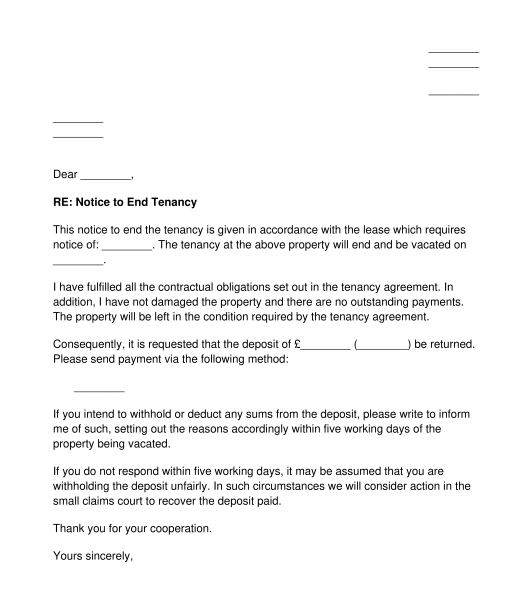 13/10/2025
13/10/2025

Answer a few questions and your document is created automatically.

Your document is ready! You will receive it in Word and PDF formats. You will be able to modify it.




Rating: 4.5 - 153 votes
Fill out the templateA notice to end tenancy is a formal written communication sent by a tenant to express their intention to end the tenancy. It is sent to the landlord, indicating the date when the tenant intends to vacate the property. This notice may also include the reason for ending the tenancy, if the tenant chooses to disclose it.
This notice applies to all residential tenancies in the UK, including England and Wales, Scotland and Northern Ireland.
No, it is not mandatory. However, it is good practice to send a notice to end a tenancy, especially where there is a written agreement that governs the tenancy.
The notice to end a tenancy serves as a written record to ensure that the tenant(s) and landlord are on the same page regarding the termination of a tenancy agreement.
Where there is a written tenancy agreement, the notice to end the tenancy must be sent in accordance with the provisions for sending all notices.
Once the Notice to End Tenancy is completed, it should be signed and posted to the landlord's contact address. If the tenancy agreement or the parties agree to sending notices via email, this notice can be sent to the landlord's email address.
The tenant should also keep a copy of the signed notice for their records.
The amount of notice tenants must give depends on the type of tenancy they have.
For a fixed-term tenancy, tenants can only give notice to leave within the terms of a break clause. If there is no break clause, tenants cannot give notice to leave before the end of the fixed term, unless the landlord agrees otherwise.
For a periodic (rolling) tenancy, which continues on a month-to-month or week-to-week basis after the fixed term has expired, tenants are required to give at least one month's notice if rent is paid monthly, or at least four weeks' notice if rent is paid weekly.
No, it is not mandatory for a tenant to provide reasons when ending a tenancy.
As long as the tenant follows the correct notice period and procedures specified in their tenancy agreement, they do not need to give a reason for leaving.
The notice to end tenancy must contain:
The tenant is entitled to the return of their deposit after the landlord has verified that no damages have been caused to the property beyond normal wear and tear. The landlord is required to return the deposit within the legally specified time frame. Any deductions from the deposit must be clearly justified, and no reductions can be made without valid reasons.
Tenancy Deposit Scheme (as established by the Housing Act 2004, as amended by the Localism Act 2011 and Deregulation Act 2015)
Tenancy Deposit Schemes (Scotland) Regulations 2011
Tenancy Deposit Schemes (Scotland) Amendment Regulations 2019
The Private Housing (Tenancies) (Scotland) Act 2016
The Housing (Amendment) Act (Northern Ireland) 2011
Private Tenancies (Northern Ireland) Order 2006
Rent Book Regulations (Northern Ireland) 2007
Tenancy Deposit Schemes Regulations (Northern Ireland) 2012
Tenancy Deposit Schemes (Amendment) Regulations (Northern Ireland) 2023
You fill out a form. The document is created before your eyes as you respond to the questions.
At the end, you receive it in Word and PDF formats. You can modify it and reuse it.
Guides to help you
Tenant's Letter Giving Notice to End Tenancy - Template
Country: United Kingdom